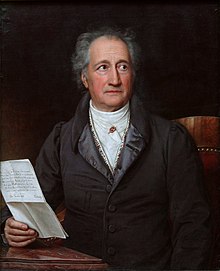Johann Wolfgang von Goethe: Ìyàtọ̀ láàrin àwọn àtúnyẹ̀wò
Content deleted Content added
k r2.7.3) (Bot: Ìtúnṣe ckb:یۆھان ڤوڵفگانگ گۆتە |
k Bot: Ìfikún ilo:Johann Wolfgang von Goethe |
||
| Ìlà 75: | Ìlà 75: | ||
[[id:Johann Wolfgang von Goethe]] |
[[id:Johann Wolfgang von Goethe]] |
||
[[ie:Johann Wolfgang von Goethe]] |
[[ie:Johann Wolfgang von Goethe]] |
||
[[ilo:Johann Wolfgang von Goethe]] |
|||
[[io:Johann Wolfgang von Goethe]] |
[[io:Johann Wolfgang von Goethe]] |
||
[[is:Johann Wolfgang von Goethe]] |
[[is:Johann Wolfgang von Goethe]] |
||
Àtúnyẹ̀wò ní 02:20, 12 Oṣù Kẹ̀wá 2012
| Johann Wolfgang von Goethe | |
|---|---|
 | |
| Ọjọ́ ìbí | 28 Oṣù Kẹjọ 1749 Free Imperial City of Frankfurt, Holy Roman Empire |
| Ọjọ́ aláìsí | 22 March 1832 (ọmọ ọdún 82) Weimar, Grand Duchy of Saxe-Weimar-Eisenach, German Confederation |
| Iṣẹ́ | Poet, Novelist, Playwright, Natural Philosopher, Diplomat, Civil servant |
| Ọmọ orílẹ̀-èdè | German |
| Literary movement | Sturm und Drang; Weimar Classicism |
| Notable works | Faust; The Sorrows of Young Werther; Wilhelm Meister's Apprenticeship; Elective Affinities; "Prometheus"; Zur Farbenlehre; Italienische Reise; Westöstlicher Diwan |
| Spouse | Christiane Vulpius |
| Signature |  |
Johann Wolfgang von Goethe (Pípè nì Jẹ́mánì: [ˈjoːhan ˈvɔlfɡaŋ fɔn ˈɡøːtə] (![]() listen), 28 August 1749 – 22 March 1832) je olukowe, onisona, ati oloselu ara orile-ede Jemani.
listen), 28 August 1749 – 22 March 1832) je olukowe, onisona, ati oloselu ara orile-ede Jemani.

|
Àyọkà yìí tàbí apá rẹ̀ únfẹ́ àtúnṣe sí. Ẹ le fẹ̀ jù báyìí lọ tàbí kí ẹ ṣàtúnṣe rẹ̀ lọ́nà tí yíò mu kúnrẹ́rẹ́. Ẹ ran Wikipedia lọ́wọ́ láti fẹ̀ẹ́ jù báyìí lọ. |
Itokasi
- ↑ Karl Robert Mandelkow, Bodo Morawe: Goethes Briefe. 2. edition. Vol. 1: Briefe der Jahre 1764-1786. Christian Wegner, Hamburg 1968, p. 709
